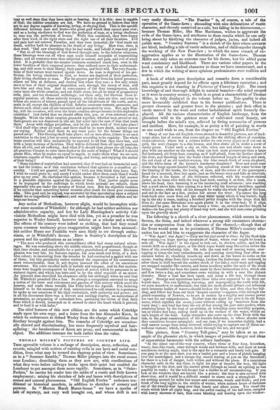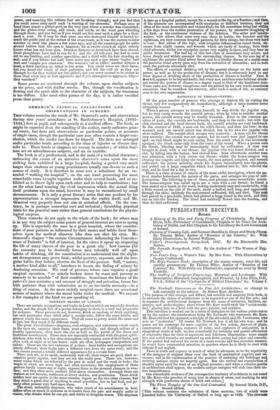THOMAS MILLER'S PICTURES OF COUNTRY LIFE.
Tins agreeable volume is a melange of description, story, reflection and reverie, mingled with notices of existing evils in our laws and social con- dition, from what may be termed the claptrap point of view. Sometimes, as in a " Summer Ramble," Thomas Miller plunges into the rural scenes near London ; describing them as they now are, with recollections of what they were before railways broke upon their quiet but enabled the Londoner to get amongst them more rapidly. Sometimes, as in "Osier- Feelers," he carries his reader into the midst of a rustic and little known employment; mixing his sketches of lads and lasses with descriptions of scenes and natural phwnomena. "Old English Ferries" embraces tra- ditional or historical anecdote, in addition to sketches of scenery and persons. In "Morton Marsh Manor-house" we have a species of sale of mystery, not very well brought out, and whose drift is not
very easily discerned. "The Poacher " is, of course, a tale of the operation of the Game-laws ; abounding with nice delineations of rustic character, and cleverly contrived as a tale, but failing in its denouement,— because Thomas Miller, like Miss Martineau, wishes to aggravate the evils of the Game-laws, and attributes to them results which he can only bring about by falsifying the character of jtidges, juries, and indeed an public men. " Country Statutes " is a sketch of the fairs where servants are hired, including a tale of rustic seduction, and of child-murder through the working of the New Poor-law ; to which the same remark of ex- aggeration applies as to the illustration of the Game-laws. Thomas Miller not only takes an extreme case for his theme, but his • added parts want consistency and likelihood. There are various other papers in the book ; some of a kindred character to those we have enumerated, and a few in which the writing of mere opinions predominates over realities and matter.
A book of which pure description and remarks form a considerable part, must greatly depend for its effects upon a felicitous execution ; and this requisite is not wanting in Pictures of Country Life. The exact knowledge of and thorough delight in natural beauties—the mind steepen as it were in country scenery, which is so great a characteristic of Thomas Miller' is fully displayed in the volume before us. This quality is also more favourably exhibited than in his former publications. There is greater closeness and greater force in the pictures ; and their effect is rarely marred by the weak and rather lackadaisical spirit formerly dis- played. All the various characteristics of English landscape, from the gloomiest wild to the quietest scene of cultivated rural beauty, are brought before the mind's eye, relieved by fitting accessories of persons and incident. Here, for example, is as pretty a bit of painting in words as one could wish to see, from the chapter on "Old English Ferries."
"Many of our fine old English rivers abound in beautiful pictures, not of land- scape alone, but of scenes that come and go, like the shifting effects of sunshine, cloud-coloured; where but a minute before we saw every object as if cut out in gold, the next changes to a dim bronze, and then shuts all in under a cover of dusky green. Under such a sky as this, when sun and shade come down to play with one another on the earth, what can look more picturesque than a large flat-bottomed, old ferry-boat, creeping, as if half-afraid, from the further shore of the river, and throwing into the water clear-shadowed images of sheep and oxen, the red cloak of an old market-woman, the blue smock-frock of some shepherd, and the white dress of the farmer's handsome daughter? Near and more near draws the huge square-headed boat, the splashing sound of the water broken by, the bleating of the lambs, the lowing of oxen, and the voices of the passengers; heard fur a moment, then lost again, just as the breeze rises and falls at intervals. How clear is the figure of the ferryman refiectedt with his weather-stained jacket, as he leans over with the long boat-hook, rearing it at first, like A mast, above his head, then lessening it as the lumbering craft advances; now reaching but a yard above him, then coming to a level with his brawny shoulders' against which it rests; while with all his strength he walks the whole length of the boat, and red in the face as a lion, pushes her across the river. Up comes the long boat-hook once more from out the clear-water under which it was buried; high up in the sky it rears, snaking a hundred pretty dimples with the drops that all from it; the same Herculean arm again plants it in the river-bed; if it slips, overboard he goes, as he has done many a time- on, onward another length he walks—he has given her plenty of head-way now, and she will soon come grinding upon the gravelly shore."
. The following is a sketch of a river phrenomenon, which occurs in the Severn, the Seine, and indeed wherever a strong tide encounters obstruc- tion or compression from the charaoter of the channel,—though that of the Trent would seem to be preeminent, if Thomas Miller's country edu- cation has not led him to exaggerate the character of the Aeger.
_ "War Agar! war Agar I '—They are but just saved in time; for the flood-tide was coming,—a huge moving mountain of water, whose roar might be heard e. mile off. War Agar I ' is the signal to look out, to slacken cables, and let the vessels drift on a short space, or the thick ropes would snap like cotton before the force of the overwhelming tide. On rolls the vast wall of moving water, over- topping at times the very embankments, and carrying everything that offers re- sistance before it; chnelring vessels up and down as the waves do corks on the ocean; tearing ships from their moorings, (unless the fastenings are unloosed, to allow them to drift beyond the sudden shock of the tide,) until mast and rigging are snapped usunder like carrots, and borne headlong under the arch of the stone bridge. Dreadful has been the havoc made by those tremendous tides, which ebb and flow twice a day, and sometimes come rushing in with a roar like distant thunder. Many a boat has been upset, and many a life lost, through these agars.' Strange and mysterious have these tides ever appeared to us from our boyish days. The sun lighting, warming, and impregnating the earth with life, we seem somehow to understand; but that the moon should attract and influence such immense bodies of water—should beckon the tides, and they obey her bid- ding, and follow her from out their 'deepest caverns '—appears, even through the grand reasoning of Newton, to be set in motion by a mighty and unseen power too vast for our comprehension. Neither does the aeger (to give it its old Bunio name, which signifies the ocean,) come without calling up monsters from the vasty deep'; and loud has been the cry of fear among the poor osier-peelers, when returning home by the boat of an evening, at beholding some unwieldy porpoise, ten or twelve feet long, rolling itself up on the surface of the water, within an oar's length of the boat. Large sturgeons also come up the river Trent with the tide, to the great consternation of the humble fisherman, in whose slender nets they sometimes become entangled; and one man, if we remember rightly, had a very narrow escape from being drowned, whilst hying to capture one of these un- welcome visiters; which, however, broke through the net, and escaped."
This picture, from "Country Toll-gates," may be taken as an ex- ample of the gloomier style, in which images of possible danger and ideas of superstition harmonize with the solitary landscape.
"In the silent out-of-the-way country, where three or four long, houseless, weary, lane-like roads, come through woods and between hills, and meet at some murderous-looking angle, that is the spot for a romantic and lonely toll-gate. If you peep in at the open door, you see a loaded gun and a brace of pistols hanging over the mantelpiece, and a savage dog stands staring at you on the threshold; for there is a look of danger, both within and without the place. If a suspicious character calls in the day-time, to light his pipe or inquire the way, the light is brought to the door, and the answer given through as small an opening as can possibly be made; for the toll-keeper has a dislike to all reconnoitering. If you look at the windows they are barred like a prison; the door is also covered with sheet-iron, and it would be a difficult matter to storm such a stronghold. You see nothing around for miles but moors and commons, woods and fields; and you think orthe lonenights in the middle of winter, when sixteen hours of darkness out of the twenty-four hang over that lonely and silent scene. You recall the winds which blow all night long, and the awful roaring of the tall trees, mingled with heavy showers of rain, that come blinding and beating upon the window- panes, and sounding like robbers that are breaking through; and you feel that you could never sleep amid such 'a warring of the elements.' Perhaps near at band there stands a gibbet-post, on the very spot where a murder *as committed; and the gibbet-irons swing, and creak, and rattle, as the wind goes whistling through them; and you feel as if you would not live near such a place for a thou- sand a year. Or it may be that some one who destroyed himself is buried be- neath the guide-post at the corner of the cross-roads, as it was the custom to inter suicides in such like Faeces a few years ago; and all the countrypeeple for miles around believe that the spot is haunted; for at twelve o'clock.at night, nobody knows what has not been seen. Drunken farmers on horseback have been chased, timid ploughboys have had to run for it; and the old toll-man has had to come Out to one fainting, and another speechless, and a third with his hair standing on end: and if you believe but half, there never was such a spot where 'bogies' laid wait and caught you unawares.' One woman's 'all in white,' another without a head, a third carrying an infant in her arms. You could never see their faces; but you heard the rustle of their garments, and felt the cold air as they cut through it—for they walked not, but glided; and you never seemed to be nearer to them than when they at first appeared; and if you attempted to approach, why— they vanished."
Some poems are scattered through the volume, upon similar subjects as the prose, and with similar merits. But, though the versification is flowing and the spirit akin to the character of the subjects, the treatment Is too diffuse. Like most other poems of the day, it is rather versified prose than poetry.



























 Previous page
Previous page